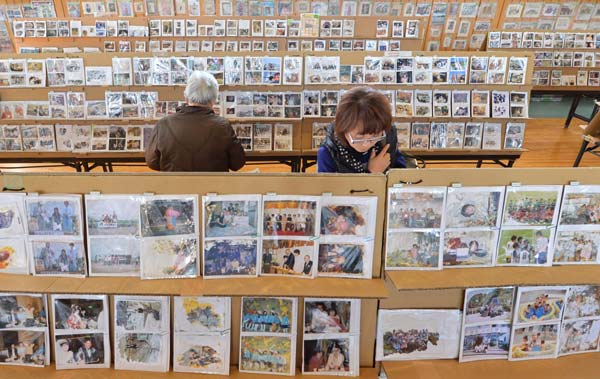 |
|
Visitors look at pictures discovered in Sendai after the 2011 earthquake and tsunami disaster at a gymnasium in Sendai, Miyagi prefecture, Japan, on Tuesday. Kazuhiro Nogi / Agence France-Presse |
Japan observed a moment of silence on Tuesday to mark the third anniversary of the earthquake-tsunami disaster that swept away thousands of victims, destroyed coastal communities and created a nuclear emergency that forced a global rethink of nuclear power.
Survivors bowed deeply and joined hands at remembrance ceremonies in towns and cities around the disaster zone and in Tokyo, where Emperor Akihito and Empress Michiko led tributes to those who died in Japan's worst peacetime disaster.
A national moment of silence followed the cry of tsunami alarm sirens, which were set off at 2:46 pm, the moment the magnitude-9.0 undersea tremor occurred.
Its raw force unleashed a towering wall of water that traveled at the speed of a jet plane to the Japanese coast. Within minutes, communities were turned to matchwood, and whole families were drowned.
Giant waves also crashed into the Fukushima nuclear power plant, sparking reactor meltdowns and explosions, and setting off the worst atomic crisis in a generation.
The crippled plant remains volatile, and the complicated decommissioning process is expected to last for decades, as fears persist over the health effects of leaked radiation. Tens of thousands were evacuated from the stricken area.
As night fell, an event in a Fukushima park saw about 2,000 lit candles arranged to read "Fukushima 3/11".
"We must sincerely regret the accident and tackle the reconstruction by keeping the hardships faced by Fukushima people in mind," Naomi Hirose, head of embattled plant operator Tokyo Electric Power, told employees at the wrecked site.
In Tokyo, Emperor Akihito paid tribute to those who died in the tragedy, and those struggling in its aftermath. "Many still lead difficult lives in devastated areas and places that were evacuated," he said. "I pray for a return of peaceful times."
Although no one died as a direct result of Fukushima, about 1,650 area residents died from complications related to stress and other problems after the accident.
A total of 15,884 people are confirmed to have died in the tsunami with another 2,633 still listed as missing. Human remains are sometimes discovered even now.
In the shattered town of Namie, just 8 km from the stricken plant, about 200 former residents, police and firefighters searched for remains. They raked a beach where broken timber and cars pulled by the waves once lay half-buried.
"Our parents are still missing," said 25-year-old former resident Miho Suzuki, who was joined by her sister.
"I don't think we'll ever find them, but we came here to take part because we felt like doing something to help."
Earlier on Monday, members of the International Nuclear Risk Assessment Group said the most important lessons from the Fukushima nuclear disaster have not been learned.
International experts, including professors, former members of nuclear authorities and independent scientists, made the claim following a meeting at the University of Natural Resources and Life Sciences in Vienna where INRAG is currently based, to coincide with the third anniversary of the disaster in Japan.
The group came to the conclusion that the destroyed nuclear reactors in Fukushima are still not under control, according to a press release. In addition, the population and decision-makers were still not adequately informed of existing risks.
AFP - AP